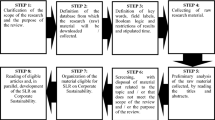Abstract
Like all areas of knowledge, environmental management has undergone a process of evolution in recent decades. It is even possible to say that this process of birth of environmental concerns on the part of business until what we have today as the state-of-the-art in environmental management is relatively young when compared to other areas.
Access this chapter
Tax calculation will be finalised at checkout
Purchases are for personal use only
Similar content being viewed by others
Notes
- 1.
Advantage obtained by the company in relation to competitors, differentiating it. It is a result of a competitive strategy and is characterized by being difficult to imitate.
- 2.
The term sustainability in this chapter does not include the social dimension.
- 3.
Those who can make a profit from the success of a business, such as a shareholder, for example.
References
Accenture: Circular advantage—innovative business models and technologies to create value in a World without limits to growth (2015)
Barbieri, J.C.: Gestão ambiental empresarial: conceitos, modelos e instrumentos. Saraiva, São Paulo (2016)
Ellen Macarthur Foundation: Towards the circular economy: economic and business rationale for an accelerated transition. Cowes: [s.n.], vol. 1 (2013)
Grayson, D., Jin, Z., Lemon, M., Rodriguez, M.A., Slaughter, S., Tay, S.: A new mindset for corporate sustainability (2008)
Hoffman, A.J.: Competitive environmental strategy: a guide to the changing business landscape. Island Press (2000)
Holmberg, J., Robèrt, K.-H.: Backcasting from non-overlaping sustainability principles—a framework for strategic planning. Int. J. Sustain. Dev. World 7 (2000)
Johnson, M.W.: How ford is thinking about the future. Harvard Bus. Rev. (2018)
Kessel, K., Rimanoczy, I., Mitchell, S.F.: The sustainability mindset: connecting being, thinking, and doing in management education. Acad. Manag. Proc. 1, 2017 (2016)
Kiron, D., Unruh, G., Kruschwitz, N., Reeves, M., Rubel, H., Felde, A.M.Z.: Sustainability at a crossroads: progress toward our common future in uncertain times. MIT Sloan Manag. Rev. (2017)
MIT: The innovation bottom line—how companies that see sustainability as both a necessity and an opportunity, and change their business models in response, are finding success. Research Report (2013)
National Zero Waste Council: Circular economy business toolkit—steps to starting your circular journey (2016)
Ometto, A.R., Amaral, W., Iritani, D.R. (org): Economia circular: oportunidades e desafios para a indústria brasileira. Confederação Nacional da Indústria. CNI, Brasília (2018)
Porter, M.: Competitive strategy: techniques for analyzing industries and competitors. Free Press (2016)
Puglieri, F.N.: Proposta de um modelo de planejamento estratégico ambiental com visão de ciclo de vida. 2015. 171f. Tese (Doutorado) – Departamento de Engenharia de Produção, Escola de Engenharia de São Carlos, Universidade de São Paulo, São Carlos (2015)
The Natural Step: Disponível em: https://thenaturalstep.org/approach/ (2014). Acesso em: 15 set. 2019
WBCSD: The CEO guide to the circular economy (2017)
Wiithaa: Circulab board—the tool to ecodesign the business models. Disponível em: https://circulab.eu/tools/ (2019)
United Nations Environment Programme (UNEP): Eco-i manual: eco-innovation implementation process (2017)
Unruh, G., Kiron, D., Kruschwitz, N., Reeves, M., Rubel, H., Felde, A.M.Z.: Investing for a sustainable future—investors care more about sustainability than many executives belive. MIT SMR Home (2016)
Author information
Authors and Affiliations
Corresponding author
Editor information
Editors and Affiliations
Rights and permissions
Copyright information
© 2021 The Author(s), under exclusive license to Springer Nature Switzerland AG
About this chapter
Cite this chapter
Puglieri, F.N., Iritani, D.R. (2021). Corporate Sustainability—Defining Business Strategies and Models from Circular Economy. In: de Oliveira, J.A., Lopes Silva, D.A., Puglieri, F.N., Saavedra, Y.M.B. (eds) Life Cycle Engineering and Management of Products. Springer, Cham. https://doi.org/10.1007/978-3-030-78044-9_10
Download citation
DOI: https://doi.org/10.1007/978-3-030-78044-9_10
Published:
Publisher Name: Springer, Cham
Print ISBN: 978-3-030-78043-2
Online ISBN: 978-3-030-78044-9
eBook Packages: Earth and Environmental ScienceEarth and Environmental Science (R0)




